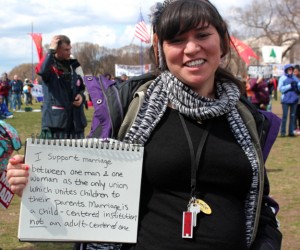Last week, as the Supreme Court heard oral arguments on two cases involving same-sex marriage (one centered on California’s Proposition 8 and the other on the Defense of Marriage Act), people around the country began to voice their opinions. One of the most attention grabbing tactics came on Facebook. The Human Rights Campaign, which advocates for Lesbian, Gay, Bisexual and Transgender rights, changed their Facebook profile Tuesday morning (March 26th) to a red equal sign to show support for same-sex marriage, and encouraged others to follow suit. This adaptation of the Human Rights Campaign’s logo then exploded all over Facebook. It was everywhere (the fact that I knew about it says something, given that I hardly ever use my Facebook). Data released by Facebook last Friday actually supports the notion that most people followed the lead of the Human Rights Campaign, as “2.7 million more people changed their profile pictures on Tuesday, March 26 compared to the previous Tuesday.” While Facebook did not track what exactly people changed their profile pictures to, one need not be Sherlock Holmes to connect the dots. The wave of red spread to Twitter (13 Congressmen changed their avatar’s to the symbol) and it began to take on a life of its own, as people started posting modified versions of the equal sign. Some adjustments were touching, others amusing, and many were just plain random, but they all helped show support for a worthy cause.
However, the red equal sign was not the only way people responded to the Supreme Court’s pending decision. The National Organization for Marriage (NOM) held a March and Rally in Washington DC to advocate protecting traditional marriage. The 10,000 individuals in attendance showcased signs that read “Respect Our Votes!” and “Kids Deserve a Mom and a Dad!” The march ended in front of the Supreme Court and the rally included 20 different speakers. Brian Brown, President of NOM said, “A diverse crowd of more than 10,000 marched today to show that those who protect marriage are on the right side of history. The Supreme Court has no right to redefine marriage and roll back the efforts of Americans to protect marriage as the union of one man and one woman, the only social arrangement that gives children the mother and father they deserve.” At the rally, one staff writer for the website BuzzFeed went around and asked twenty different young people why they supported traditional marriage, and this is what a few of them had to say:
I respect the views of others. In my opinion, what you believe is your business, not mine, and I want nothing to do with it (as my best friend says “do you”). However, I have trouble wrapping my head around many of the arguments presented in support of traditional marriage. These are just a few statements that puzzle me.
“Kids Deserve a Mom and a Dad!”
What about single parents? Based on this logic they should not be allowed to have children. However, in reality, numerous children go through life with only one parent and can still have a fulfilling and wonderful childhood. So why does having two fathers or two mothers make a difference? In my opinion, having someone who loves you, cares for you, and protects you is a much higher priority than having parents of opposite genders.
“It is written in the bible.”/”Adam and Eve not Adam and Steve.”/”Marriage is not a right but a call from God.”/etc.
I would never tell anyone how to practice their religion or what to believe in. If you steadfastly believe that God does not support same-sex unions as a part of your religion then that is your choice and it is not my place to tell you what to do. However, marriage is not a strictly Christian institution – people of all different religions and beliefs get married and receive the legal benefits of that union. Since the institution is not restricted to one religion, no religion has the right to set restrictions that apply to everyone and not just their followers. To do so would be to project your religious beliefs on others. That is your business and your choice, not anyone else’s.
“Marriage is a child-centered institution, not an adult centered one, which unites children to their parents.”
So many people get married without the intention of having children, or they get married but learn that one spouse is physically incapable of conceiving a child. This does not mean they should no longer be married. In a modern sense, marriage is not solely about children but about love – a life long commitment to another person.
Hopefully in July the Supreme Court will agree with me, but the Justices and the nation in general are so divided on the issue, that almost anything could happen.
http://www.huffingtonpost.com/2013/03/29/red-equal-sign-facebook_n_2980489.html
http://www.cnn.com/interactive/2012/10/politics/scotus.cases/index.html
http://www.huffingtonpost.com/2013/03/26/facebook-profile-pictures-red-gay-marriage_n_2957968.html
http://abcnews.go.com/blogs/technology/2013/03/what-is-that-red-equal-sign-on-facebook-all-about/
http://www.nationformarriage.org/site/apps/nlnet/content2.aspx?c=omL2KeN0LzH&b=5075187&ct=13053133
http://www.buzzfeed.com/mjs538/young-people-who-believe-marriage-should-be-between-a-man-an
http://www.hrc.org/blog/entry/slideshow-hrc-logo-memes
http://www.huffingtonpost.com/2013/03/26/supreme-court-proposition-8_n_2950615.html




























